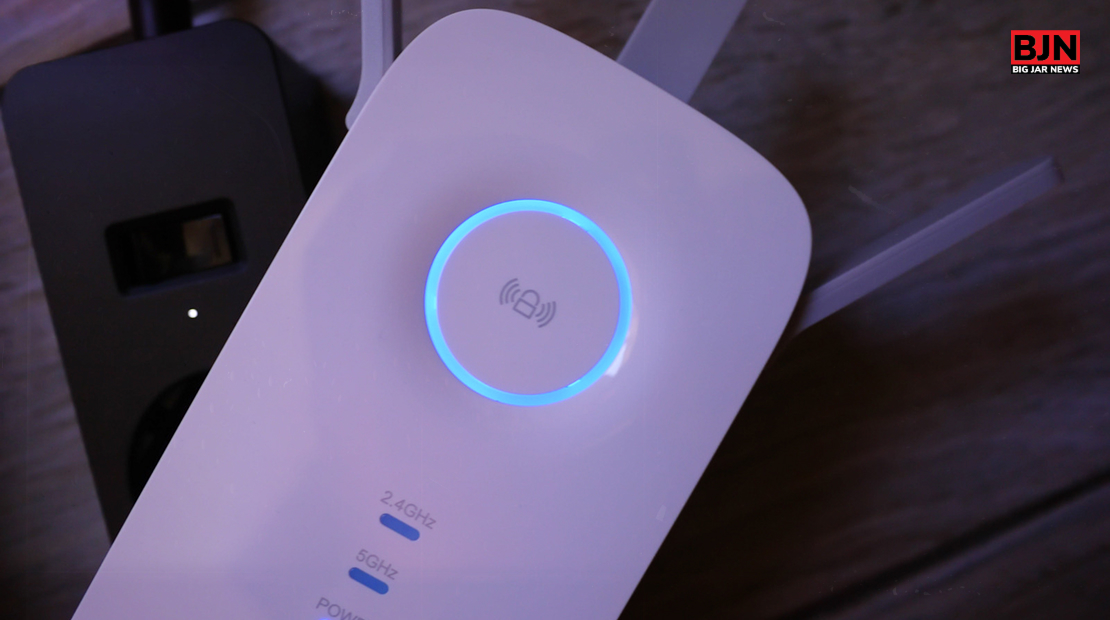WiFi Extender Vs Booster: Who Is The Winner In This War Of Connectivity?

Table Of Contents
WiFi booster, WiFi extender, and WiFi repeater! These names are often used interchangeably for devices rebroadcasting Wi-Fi signals.
However, there are differences in the core technologies. So, knowing the WiFi extender vs booster difference and choosing the right broadcasting device are important to enhance the Wi-Fi setup at home.
In this article, I will talk about these differences and which one will be the most suitable for you. However, before summarizing the differences, we need to have a clear concept of some terms and the use of these WiFi rebroadcasting devices.
WiFi Extender Vs Booster: What Is The Real Difference?
All of us have dead zones in our homes. However, your device will not die even in those places if you use the right WiFi rebroadcasting device.
So, let’s find out the difference between a WiFi booster and an extender.
1. What Is A WiFi Extender?
A WiFi extender or a range extender is also known as a wireless repeater. It will capture the signal from your router and retransmit it to the areas of your house where the signal strength is weak.
So, with an extender, you don’t need an extra cable or hardware to enhance the WiFi coverage.
How Does A WiFi Extender Work?
- It will get connected to your router either with an Ethernet cable or through wireless connectivity.
- Then, it will capture the signal from the router.
- Finally, it will enhance and extend the signal to a broader area.
2. What Is A WiFi Booster?
WiFi Booster is a broader term. A booster can be any of the following types.
- Powerline Adapter
- Signal Repeater
- An Extender
So, an extender is a type of booster, but not every booster is an extender. The designs and features of WiFi boosters are diverse. It can be easily plugged into an outlet and start working.
However, there can also be a booster that will have many access points, and it can function as part of a larger setup. You will decide the kind of booster to use based on the router you have, the space to be covered, and the performance efficiency you need.
Do WiFi Boosters Actually Work?
Yes, WiFi boosters are definitely effective solutions. However, the performance of a booster will depend on the type of booster you are using.
Also, the network, the setup of your building, and the placement of the booster impact the efficiency.
In addition, a WiFi booster may not function at its best in the presence of the following elements.
- Walls interfering signal
- Cordless phones and microwaves are interfering with the signal
- Boosters are outdated and not compatible with “WiFi 6 or 6E.”
3. How Are A WiFi Booster And A WiFi Extender Different?
A WiFi extender can improve the coverage of a WiFi network. You can use a WiFi extender to enhance the performance of your smart devices and internet speed in a small or medium-sized house.
However, if you live in a big house, you will need a mesh WiFi booster. A mesh WiFi comes with various satellite routers (wireless) along with its main router.
Also, often used interchangeably, a WiFi booster and a WiFi extender are technically different. Check out the next section.
4. A Summary Table Of WiFi Booster Vs Extender Technical Differences
| Features | WiFi Booster | WiFi Extender |
|---|---|---|
| Signal Source | It can use mesh or powerline. | It can be wired or wireless. |
| Effectiveness | Its performance may vary based on the environment and area covered. | It can enhance its performance with caveats. |
| Setup Requirements | The setup requirements change based on the following types of boosters used. Ehernet-Based Boosters Mesh Plugged-In. | Generally, it is set up between a device and a router. This position is usually halfway. |
| Primary Function | It is a broad or generic term for all devices that enhance WiFi signals. | It usually repeats and then rebroadcasts the WiFi. |
What Are The Types Of WiFi Boosting Solutions?
You can start your day with video calls and end your day with streaming your favorite show if you have an efficient WiFi booster at home. You just have to choose the right type of WiFi boosting solution.
1. Conventional Extenders Or Repeaters
A Wi-Fi extender captures the signal from the router using digital processing and antennas to extend the Wi-Fi coverage. Thus, even the dead corners or hard-to-cover areas, such as the outdoor spaces and offices, will not be “dead” anymore.
You can choose an extender that will use the same network name, but an extender can also connect to a network you have named.
The conventional repeaters or extenders are great. However, they can cause bandwidth issues as they will be retransmitting data on the same frequency band. Also, there can be latency issues due to the “double-hop” transmission process.
2. Mesh WiFi Systems
These systems come with a router and satellite antennas. Thus, they are more suitable for the whole home coverage.
NETGEAR Orbi and similar mesh WiFi systems can create a seamless network, which will offer equal connectivity in every room. So, practically, there is no dead spot in your room.
3. Wireless Access Points (AP)
It is a powerful yet advanced router for offices and commercial usage. The internet connection is faster and more reliable.
However, the setup can be a little complicated as they need various elements such as PoE switches and Ethernet cables.
Why Are Mesh WiFi Systems Better Than The Conventional Ones?
You can improve the reach of your WiFi with a traditional booster. However, there can be bandwidth issues. So, gaming sessions and video calls can lag.
On the other hand, mesh WiFi systems can lower latency, and they are expandable for a big house or office.
When To Use A Traditional Extender And When To Use A Mesh System?
Things can get really confusing when you have to choose among a booster, repeater, extender, and router.
However, today, there are options such as the NETGEAR WiFi 7 extenders, repeaters, and mesh systems that can cater to every type of home.
What Is The Best Extender For A Budget-Friendly User?
The most budget-friendly option is “Nighthawk WiFi 7 Dual-Band Extender (EXS27).” It works with a wide range of WiFi 6 and WiFi 5 routers.
Along with being a budget-friendly solution, it also has an easy “plug-and-play” model. Furthermore, you can position it easily in an office or domestic setup, irrespective of the layout.
What Is The Best WiFi 7 Router For Performance?
The Nighthawk RS700S Router is the best option if you have a 3000 square feet or bigger home. It can offer connectivity to more than 200 devices simultaneously and yet offer a speed of aroud 19Gbps.
What Is The Best Mesh System For Performance?
Orbi 970 Quad-Band Mesh is the best mesh system for performance. It can connect to 200 devices and cover a home with an area of around 10000 square feet.
What Is The Best Option For Stable Coverage?
Wired access points are the best options for stable coverage. The connections transmitted through Ethernet ports are reliable. So, gamers and streamers love them.
Expert Tips:
MoCA adapters with coaxial cables are more useful for backhaul options.
How Can You Boost The WiFi Connectivity Of Your House?
You can improve the WiFi connectivity of your house and improve device performance by taking the following measures.
- Ensure the interference is less.
- You need to optimize your router placement.
- Make sure that there is less congestion with an optimal use of quad-band, tri-band, and dual-band.
- You can improve your WiFi 5 to WiFi 6 and even go more advanced with WiFi 7.
- Consider advanced options such as a Nighthawk standalone router or NETGEAR Orbi Mesh.
Are WiFi Extenders And Boosters Safe?
Most of the WiFi extenders and boosters come with WPA3 and WPA2 encryptions. However, a faulty setup can pose security threats. Furthermore, if the firmware is outdated, the password is weak, or the encryption is incompatible, safety is compromised.
Furthermore, you have to use a high-grade device, especially if your business involves online payment processing and sensitive data.
WiFi Extender Vs Booster: Which One Is The Best For You?
The answer lies in the specific goals/requirements and setups you have. Check out the table below to understand which one is a better option under different situations.
| Requirements/Goals | WiFi Extender Vs Booster |
|---|---|
| Expanding the WiFi signal to an additional area or room | WiFi Extender |
| Turning “Dead Zones” into “Connected Zones” for a large area | Mesh Network Booster |
| Better speed and low latency | Ethernet Backhaul |
| Multiple users and support for IoT devices | Enterprise Wireless LAN |
WiFi Booster Vs Extender: Building A Strong Network
It is important that we don’t get confused with various names such as WiFi repeaters, boosters, and extenders, and know which solution will work for your home or office.
Furthermore, the area of every home is different, and so are the dead zones. Furthermore, the activities dependent on the internet and the number of dependent devices will be different.
WiFi Extender Vs Booster: Frequently Asked Questions (FAQs)
Here are the frequently asked questions and answers about a WiFi extender vs a booster.
The best option for gaming is a wired access point. However, you can also use a mesh system as it offers a broader coverage with lower latency. So, there will be fewer bandwidth issues.
A mesh system is a kind of WiFi booster. It is better than traditional extenders as it can offer coverage for a larger area. Furthermore, it does not have the bandwidth or latency issues of traditional repeaters or extenders.
A wired access point is where your router connects to a powered line or an Ethernet port. It is ideal for commercial usage and offers the most stable connection.
You must choose a WiFi mesh to improve the internet connection in a large, multi-storied home. Also, you can tailor these systems based on your network requirements.

























